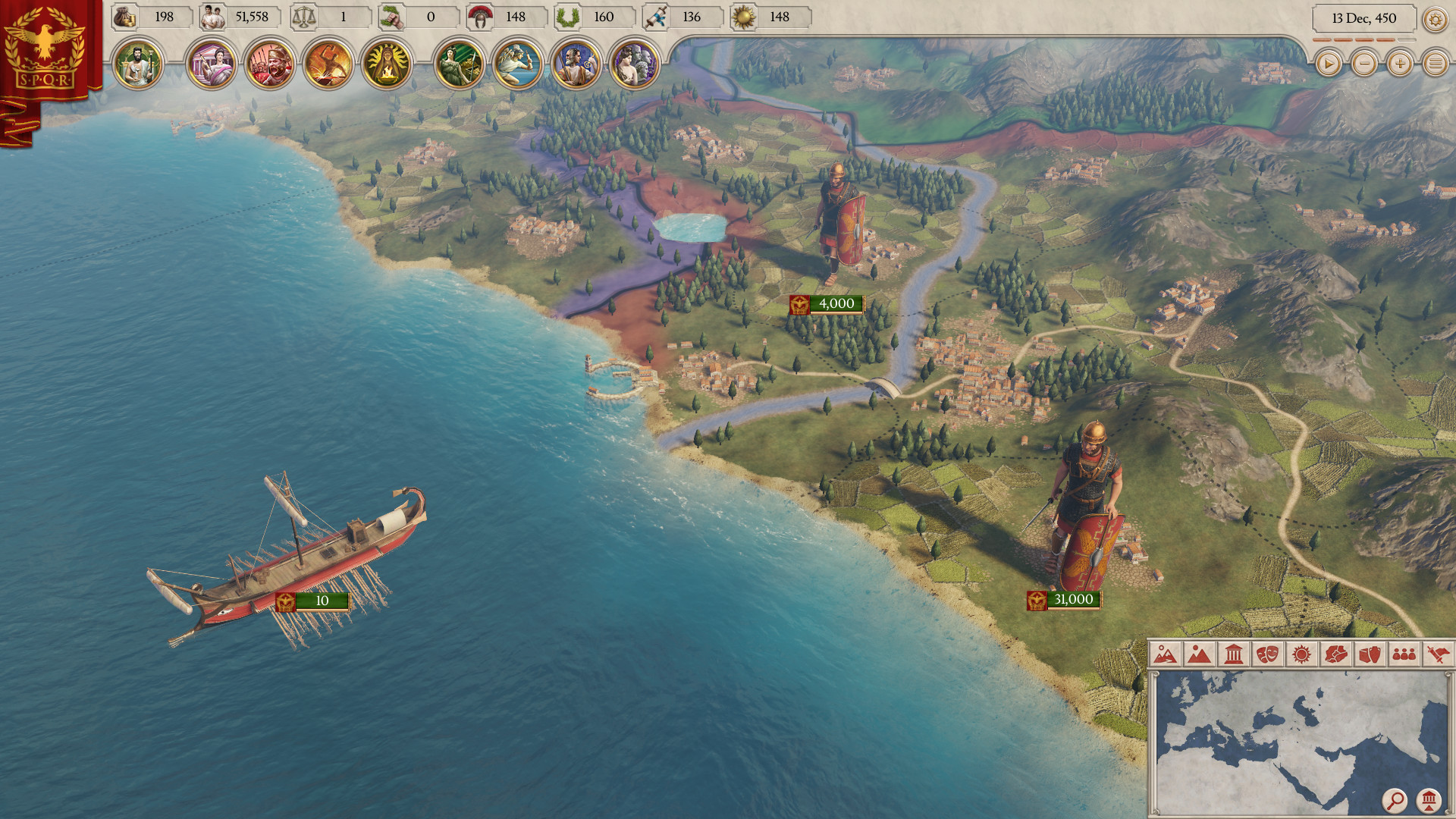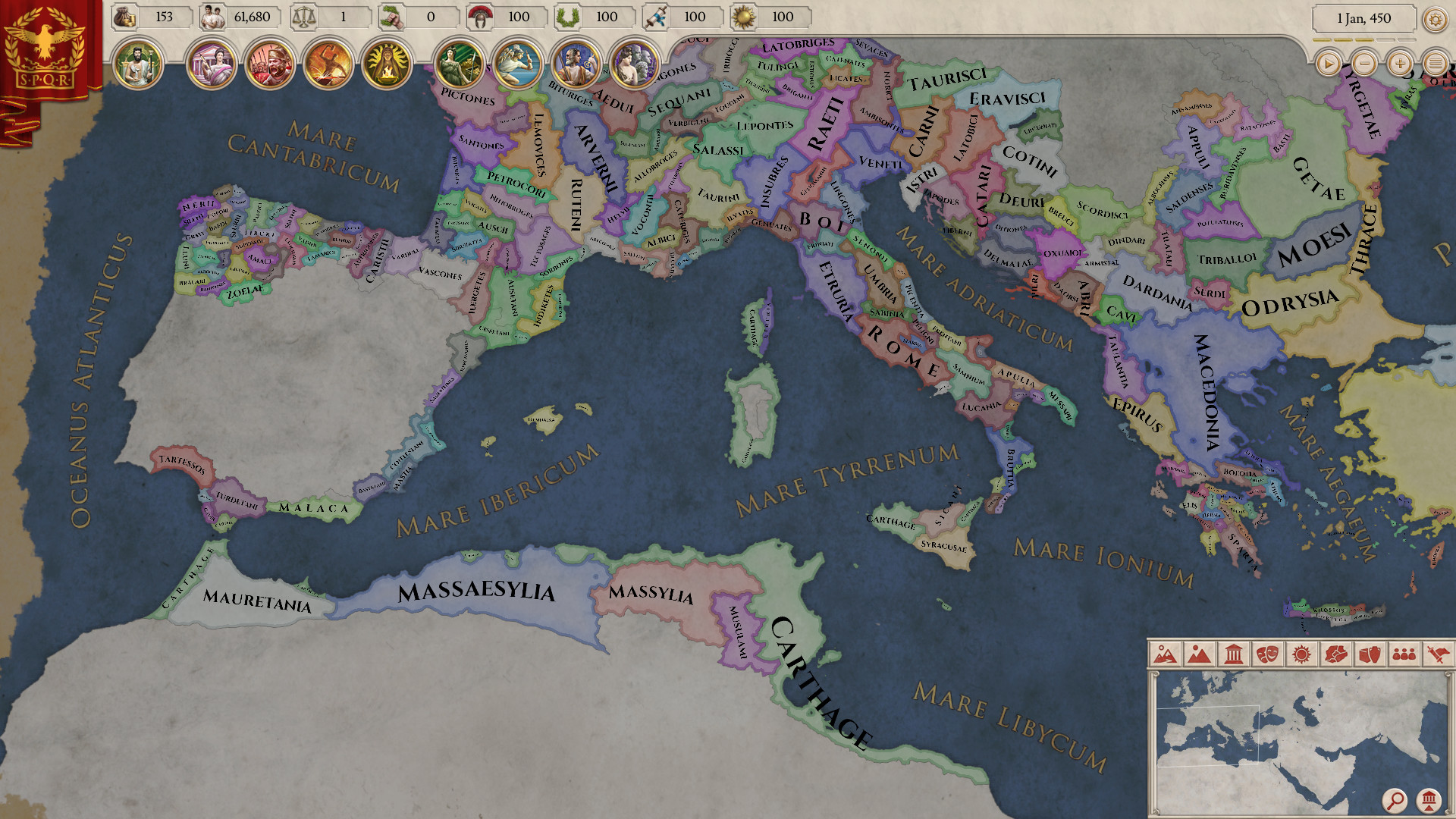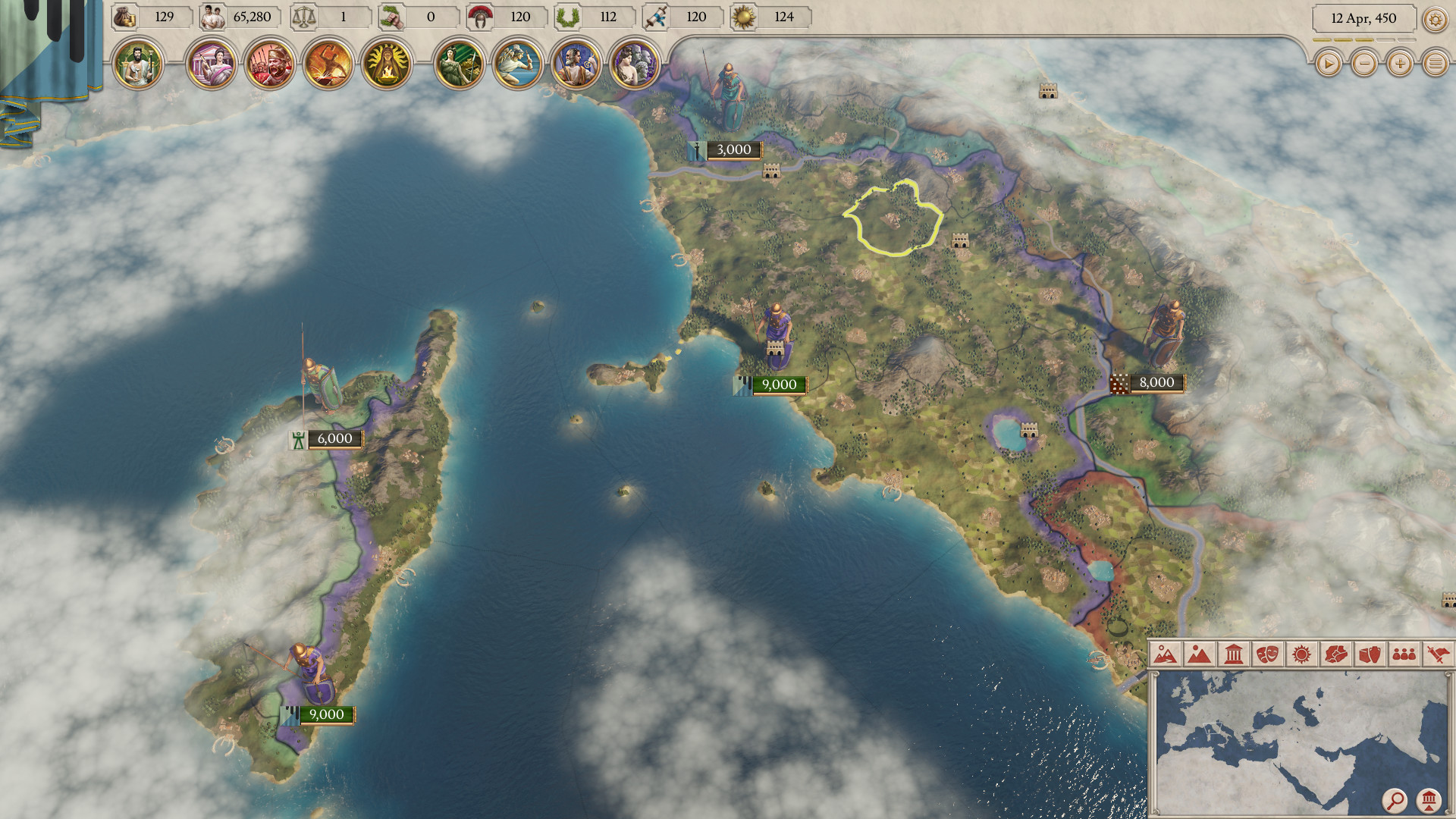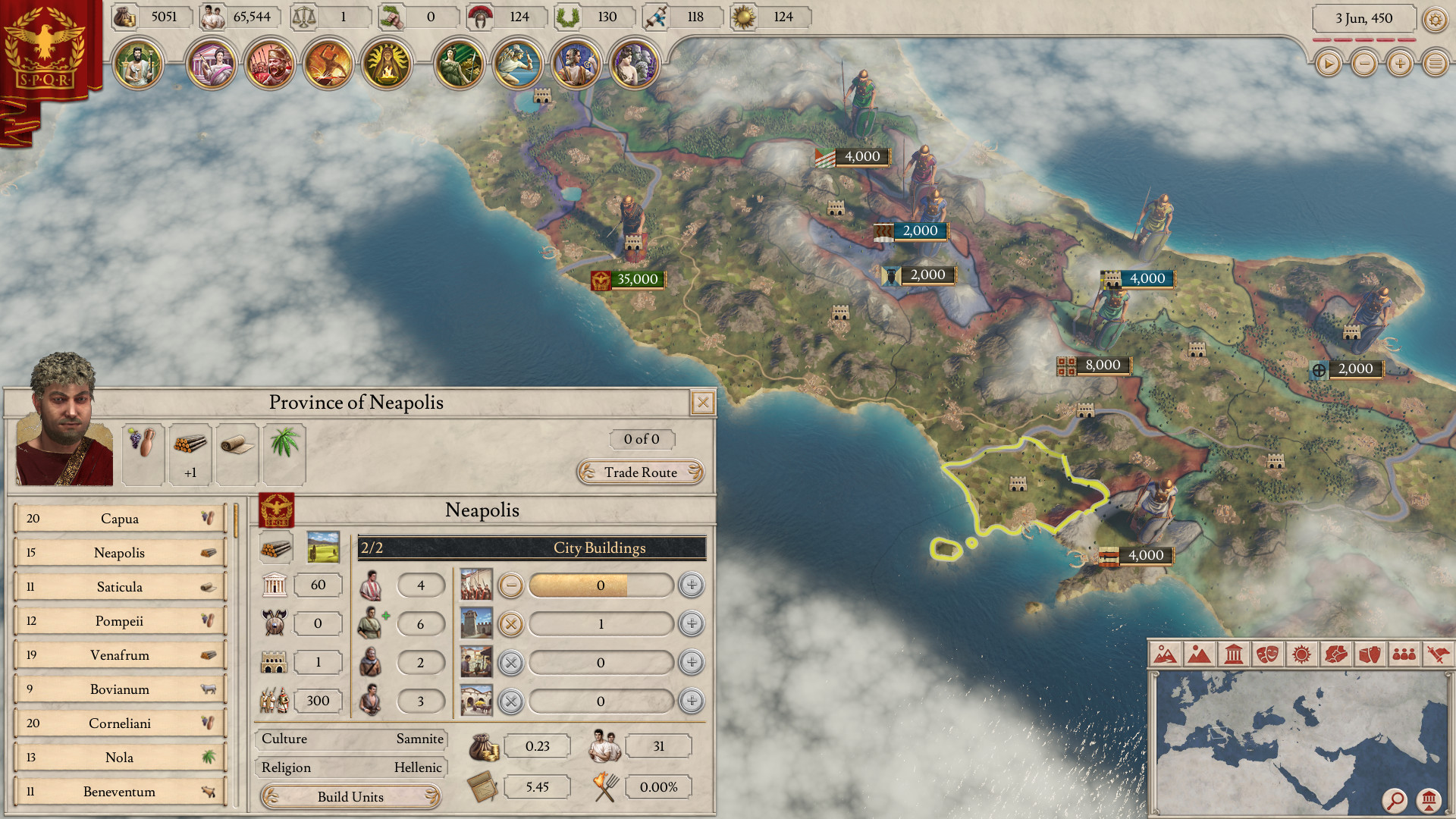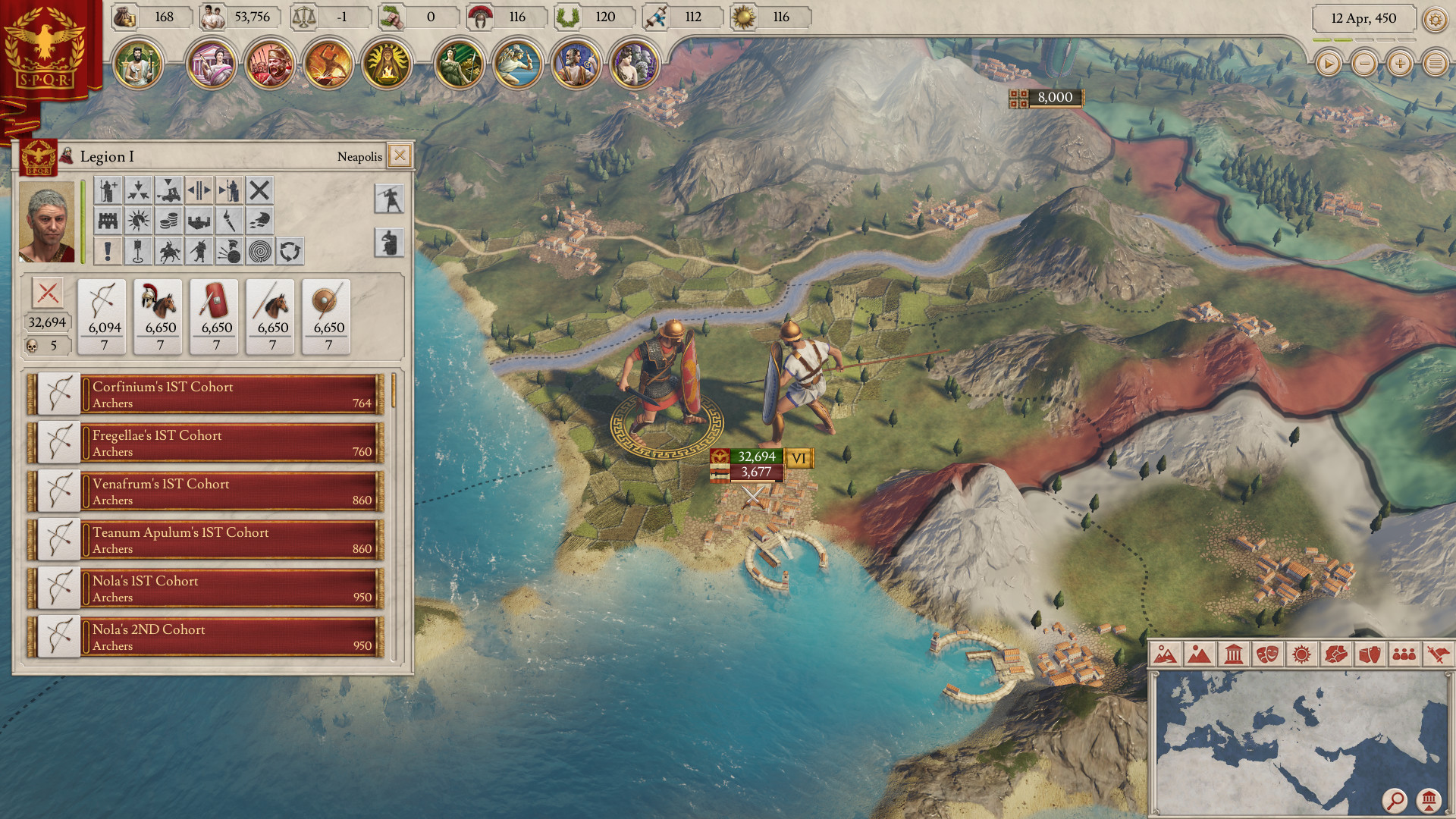Alexander. Hannibal. Caesar. These great men and dozens like them shaped the destiny of a continent. Mighty kings, clever generals and would-be gods made their mark on the ancient Mediterranean. Around this sea, close knit nations tested their mettle and virtue against each other in fierce combat, their cultural and political legacy now inseparable from what we understand as Western Civilization. But nothing was guaranteed. Can you change the course of history in Imperator: Rome?
Imperator: Rome is the newest grand strategy title from Paradox Development Studio. Set in the tumultuous centuries from Alexander’s Successor Empires in the East to the foundation of the Roman Empire, Imperator: Rome invites you to relive the pageantry and challenges of empire building in the classical era. Manage your population, keep an eye out for treachery, and keep faith with your gods.
Imperator: Rome is the newest grand strategy title from Paradox Development Studio. Set in the tumultuous centuries from Alexander’s Successor Empires in the East to the foundation of the Roman Empire, Imperator: Rome invites you to relive the pageantry and challenges of empire building in the classical era. Manage your population, keep an eye out for treachery, and keep faith with your gods.
Imperator: Rome’s features include:
Character Management:
A living world of characters with varying skills and traits that will change over time. They will lead your nation, govern your provinces and command your armies and fleets. We also introduce our new, more human-like character art.Diverse Populations:
Citizens, freemen, tribesmen and slaves - each population with its own culture and religion. Whether they fill your armies, fill your coffers or fill your colonies, keep an eye on their happiness - your success depends on their satisfaction.Battle Tactics:
Choose your approach before battle to counter the stratagems of your foes.Military Traditions:
Each culture has a unique way of waging war. Romans and Celts have different options available to them. Unlock unique bonuses, abilities and units.Different Government Types:
Manage the senate in a Republic, hold your court together in a monarchy, answer to the clans in a tribal system.Barbarians and Rebellions:
Migrating barbarians may sack or settle your best land, while disloyal governors or generals can turn against you - taking their armies with them!Trade:
Goods provide bonuses to their home province. Will you take advantage of stockpiles for local strength or trade excess goods to spread the wealth around?Provincial Improvement:
Invest in buildings, roads and defences to make your kingdom stronger and richer.
Development Diary #60 - Reworking Monarch Power
One of the more controversial aspects of the game at release, was the implementation of Monarch Power. After reading reams of feedback on the subject, and considering the available options, we elected to look at reworking the entire concept of Monarch Power in the Cicero update.
The community issues with the 1.0 monarch power system could broadly be boiled down into two main categories:
Enter Political Influence. PI is intended to represent exactly what it describes: the influence that a government or nation has over their own political establishment.
The way in which it is produced is also related directly to the political establishment. Each primary Office holder in your nation will contribute to the PI gain of your nation, based on their loyalty to your cause. The more loyal your cabinet, the less practical power you will have to perform the various actions associated with PI.
Which leads me comfortably to the next topic we covered as part of the power rework, and point two of the community issues surrounding Monarch Power. A huge variety of actions that previously had a token power cost, have been redesigned to use one of our newer, more dynamic resources. Tyranny, Stability, Political Influence, Corruption and even Aggressive Expansion have a more clear-cut purpose; the logical solution was to use these to represent the consequences of your actions, rather than attach an abstract cost:value ratio to things such as Bribery, selection of National Ideas, inviting investment, and more.

Of course, there are still actions that demand the use of more conventional currency. Gold still plays a large part in a functional government of Antiquity, perhaps even more so in the Cicero update. The power cost for inventions, for example, has been replaced with a scaling gold cost, representing the direct cost of investment into research and development:

In addition to reworks to the cost of many actions and abilities, it became quickly apparent that many actions needed no cost at all, and functioned as their own opportunity cost, or had a consequential cost. An example of this would be the Assault ability for armies; the manpower lost during an assault vastly outweighed any token power cost, and as such, has no action cost in Cicero. Citing an example of opportunity cost, Omens will no longer have an up-front price; the opportunity cost comes of being tied to your chosen omen for the entire duration, unable to switch or cancel the ongoing omen.
The one instance that we felt was not covered by any of our new or old systems, was the Military Tradition mechanic. This needed something unique, and as such, we needed a unique method by which to unlock and acquire traditions.
It felt appropriate to treat Traditions as a self-contained system, and the Cicero update will include a Military Experience resource. This will be generated over time at a modest base rate, but is modified by the average combat experience level of your national cohorts.
Military Drill is introduced alongside this, as a way for armies to maintain a certain level of experience during peacetime. The employment of Mercenary forces will detract from a nations Military Experience gain, but have been made vastly cheaper to maintain, to compensate for this.

Rulers will not be entirely without merit in the Cicero update, with each of the four statistics granting you bonuses to certain stats, scaled by the value of the stat itself:
To conclude, we realised early on in the testing cycle for these changes, that it felt more organic, dynamic, and most importantly fun, to utilise resources in this way. That said, if you wish to be the judges of this yourselves, the open beta for the Cicero update is still underway, we invite you to try it out!
/Arheo
Click here to discuss this week's development diary with our team!
Welcome back to another Dev Diary for Imperator: Rome!
Once again, well be covering some information that those of you using the open beta branch will already have been playing with.
Monarch Power
Before we dive in to the mechanics and solutions behind the monarch power rework, Id like to explain a little bit about the impetus behind the changes, and the varying factors at play.One of the more controversial aspects of the game at release, was the implementation of Monarch Power. After reading reams of feedback on the subject, and considering the available options, we elected to look at reworking the entire concept of Monarch Power in the Cicero update.
The community issues with the 1.0 monarch power system could broadly be boiled down into two main categories:
- The lack of control over the stats that your monarch or ruler has.
- The inconsistency of the varying purposes power was intended to be used for.
Enter Political Influence. PI is intended to represent exactly what it describes: the influence that a government or nation has over their own political establishment.
The way in which it is produced is also related directly to the political establishment. Each primary Office holder in your nation will contribute to the PI gain of your nation, based on their loyalty to your cause. The more loyal your cabinet, the less practical power you will have to perform the various actions associated with PI.
Which leads me comfortably to the next topic we covered as part of the power rework, and point two of the community issues surrounding Monarch Power. A huge variety of actions that previously had a token power cost, have been redesigned to use one of our newer, more dynamic resources. Tyranny, Stability, Political Influence, Corruption and even Aggressive Expansion have a more clear-cut purpose; the logical solution was to use these to represent the consequences of your actions, rather than attach an abstract cost:value ratio to things such as Bribery, selection of National Ideas, inviting investment, and more.

Of course, there are still actions that demand the use of more conventional currency. Gold still plays a large part in a functional government of Antiquity, perhaps even more so in the Cicero update. The power cost for inventions, for example, has been replaced with a scaling gold cost, representing the direct cost of investment into research and development:

In addition to reworks to the cost of many actions and abilities, it became quickly apparent that many actions needed no cost at all, and functioned as their own opportunity cost, or had a consequential cost. An example of this would be the Assault ability for armies; the manpower lost during an assault vastly outweighed any token power cost, and as such, has no action cost in Cicero. Citing an example of opportunity cost, Omens will no longer have an up-front price; the opportunity cost comes of being tied to your chosen omen for the entire duration, unable to switch or cancel the ongoing omen.
The one instance that we felt was not covered by any of our new or old systems, was the Military Tradition mechanic. This needed something unique, and as such, we needed a unique method by which to unlock and acquire traditions.
It felt appropriate to treat Traditions as a self-contained system, and the Cicero update will include a Military Experience resource. This will be generated over time at a modest base rate, but is modified by the average combat experience level of your national cohorts.
Military Drill is introduced alongside this, as a way for armies to maintain a certain level of experience during peacetime. The employment of Mercenary forces will detract from a nations Military Experience gain, but have been made vastly cheaper to maintain, to compensate for this.

Rulers will not be entirely without merit in the Cicero update, with each of the four statistics granting you bonuses to certain stats, scaled by the value of the stat itself:
- Martial: Manpower Recovery and Land Morale Recovery
- Finesse: Commerce Modifier and Build Cost
- Charisma: Monthly Tyranny Decay and Claim Fabrication speed
- Zeal: Monthly Stability Increase and War Exhaustion Decay
To conclude, we realised early on in the testing cycle for these changes, that it felt more organic, dynamic, and most importantly fun, to utilise resources in this way. That said, if you wish to be the judges of this yourselves, the open beta for the Cicero update is still underway, we invite you to try it out!
/Arheo
Click here to discuss this week's development diary with our team!
[ 2019-08-19 13:38:22 CET ] [Original Post]
Minimum Setup
- OS: Ubuntu 20.04
- Processor: Intel iCore i3-550 or AMD Phenom II X6 1055TMemory: 4 GB RAM
- Memory: 4 GB RAM
- Graphics: Nvidia GeForce GTX 460 or AMD Radeon HD 6970
Recommended Setup
- OS: Ubuntu 20.04
- Processor: Intel iCore i5- 3570K or AMD Ryzen 3 2200GMemory: 6 GB RAM
- Graphics: Nvidia GeForce GTX 660 or AMD Radeon R9 380
GAMEBILLET
[ 6415 ]
FANATICAL
[ 7146 ]
GAMERSGATE
[ 3628 ]
MacGameStore
[ 4850 ]
FANATICAL BUNDLES
HUMBLE BUNDLES
by buying games/dlcs from affiliate links you are supporting tuxDB

